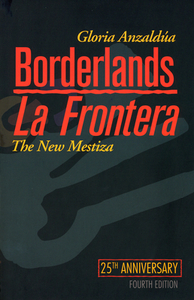You need to sign in or sign up before continuing.
Take a photo of a barcode or cover
This book is a classic - but you already knew that. It took me a long time to read because she writes in such Spanish slang and/or dialect that I had to use a dictionary A LOT, and much of the time only marginally successfully, but it was so, so good. Anzaldúa is frequently, rightly compared to Audre Lorde, and I had a very similar feeling while reading this book as to Sister, Outsider. Anzaldúa covers so much ground, and was one of the first feminists - if not the first - to publish such as widely-read book on women of color, particularly in the Latinx community. I really appreciated and learned from her focus on indigenous influences and pre-Christian traditions that centered women in Mexico and other parts of Latin America. The bilingualism in the book is also unapologetic and gritty and gorgeous. I loved everything about it (even if it was terribly difficult to read for me), and the book in general.
challenging
emotional
informative
inspiring
reflective
fast-paced
I only have good words about this book. In fact, I have so many god words that I don't even know how to explain my fascination with it. In fact, I read it twice, one after the other, because I couldn't be more amazed by it (and I will read it multiple times more)
This was one of the best books I've read about that feeling so many of us have: living in the middle of two identities and realities. It helps that I love Anzaldua's writing. This is a great read for anybody interested in gender studies, Latino studies, and identity.
challenging
hopeful
informative
reflective
medium-paced
Anzaldua offers an important analysis of multiplicious identities in this book. This work is vital to understanding Latina feminism and the undermining of the idea of a static subjectivity.



